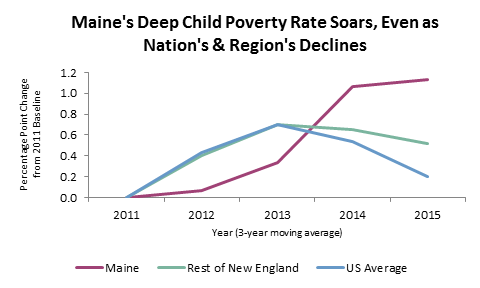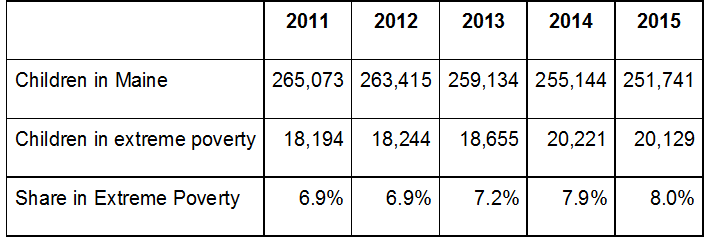For the last seven years, Maine’s Department of Health and Human Services (DHHS) policies have contributed to the disturbing escalation in child poverty and stashed or misappropriated tens of millions of federal dollars intended for Maine children. Recently, Maine House Speaker Sara Gideon unveiled a bi-partisan proposal (LD1475, An Act to Reduce Child Poverty by Leveraging Investments in Families Today) to enable struggling families to lift themselves out of poverty.
Here’s what Mainers need to know:
- The percentage of Maine children living in extreme poverty – less than $10,000 a year for a family of three – rose eight times more than the national rate from 2011 to 2015. While the nation saw a 2% increase in extreme child poverty defined as 50% of the federal poverty line, Maine’s extreme child poverty rate rose by 16%. Maine’s rate of increase is twice that of our New England neighborhoods.

source: MECEP analysis of US Census Bureau, American Community Survey data, 3-year averages constructed by MECEP.
- Where extreme child poverty is concerned, Maine is trending in the wrong direction. Between 2013 and 2015, Maine is one of only six states where extreme child poverty increased based on three year averages. In fact, Maine had the greatest increase in extreme child poverty in the nation.
- During the LePage administration, Maine has gone from leader to laggard when it comes to advancing effective solutions to address extreme child poverty. In 2011, Maine ranked 11th best among states in its level of child poverty. In 2015, the most recent year for which data is available, Maine ranks 21st. This the most precipitous slide in the rankings of any state.
- Maine children are worse off today than they were before Governor LePage took office because of deliberate choices made by DHHS and the governor. Extreme child poverty has increased as Maine DHHS has stockpiled funds intended to help struggling families lift themselves out of poverty. But extreme child poverty is not the only indicator of failed policies. Other troubling outcomes include a rise in infant mortality in Maine and being one of two states to experience an increase in the percentage of children without health coverage.
In an attempt to deflect attention from their failures, Maine DHHS cites the fact that the number of children in deep poverty has remained more or less constant over the past four years in Maine. But that claim illustrates their lack of understanding of the issue and the data.
While the number of Maine children in extreme poverty has remained relatively similar, the share of Maine children in extreme poverty has increased. That’s because, as Maine’s birth rate declines, the number of children in the state has also declined. Maine had approximately 15,000 fewer children in 2015 than in 2011.
Furthermore, Maine DHHS relies on data from Kids Count to support their claim that deep child poverty has been relatively constant. Kids Count uses single-year estimates from the census bureau’s American Community Survey. These single-year estimates have significant margins of error and tend to fluctuate more from one year to the next. To control for such fluctuations and obtain more reliable estimates, it is standard practice to utilize three- or five-year averages with this kind of data. MECEP used a three year average and found that 2,000 more children were living in extreme poverty. These data are highlighted below.

Source: MECEP analysis of US Census Bureau, American Community Survey, 3-year averages constructed by MECEP.
One child living in extreme child poverty is one child too many. The facts clearly show that the policies of Governor LePage and his DHHS and the misuse of federal funds have failed, resulting in an inexcusable increase in extreme child poverty in Maine. The bipartisan LIFT bill will put Maine back on course, use the funds appropriated as Congress directed, and provide more Maine children and their families with the support they need to escape the grip of extreme poverty.



